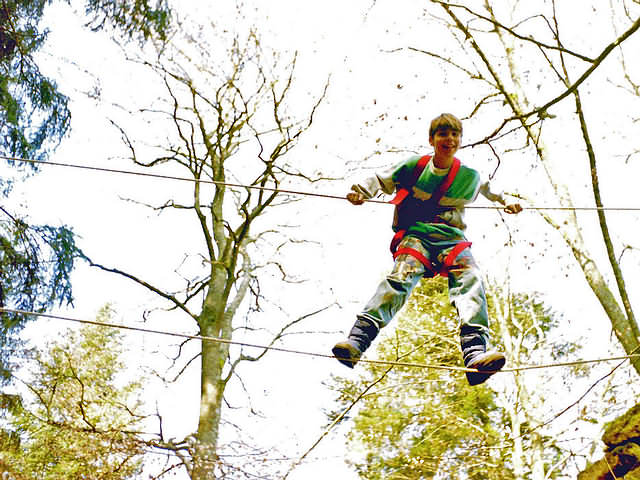source: www.youthwork-practice.com | 2000 Games, Devotions, Themes, Ideas and more for Youth Work
only for private using
Conveying self-esteem and self-confidence
Very self-confident people possess the skill to have confidence in their strength and have the courage and the decisiveness to feel good about themselves and their cause. They feel equal and valued and show no fear or uncertainties relating to other people.

Self esteem
tinadefortunata - Fotolia
How can these characteristics build? Today we know that a child is set on a particular path already at an early age. For children and young people to evolve and develop such characteristics – a personality, they need a lot of attention, love, security, support, motivation and encouragement. There are many little things that can interrupt this personal development of growth. Those disturbances will contribute, for the young person to develop a lack of self-esteem.
In this short article, we would like to give some tips and hints, which will help the young person on the path of developing a healthy self-confidence. Those tips and suggestions are an important part of all youth work and thought to support the youth worker in his work.
How does self-confidence show?
As mentioned before, people with a healthy self-esteem trust in their abilities and do not shy away easily from challenging tasks or situations.
Self-confidence has nothing to do with overconfidence or even hubris. It comes with the knowledge “I am capable of doing something” and not necessarily have I to know everything or have to be better than everyone else.
Another characteristic might be to be free of fear. This does not mean to plunge himself in a death-defying manner into the next presenting opportunity. It just means, he is free of fear of other people, free of fear to express his opinion or who he is, whether others accept him.
Which characteristics suggest a low self-esteem?
People with low self-esteem are filled with self-doubt and fears in many ways. Self-doubt, self-judgment, self-pity are constantly on his mind. Typical statements, opinions and attitudes towards themselves go something like that:

uncertainty | ©: www.praxis-jugendarbeit.de
-
I can’t do anything, I am a failure (he lacks self-confidence in his performance)
-
Others are better, more popular, more attractive than I am
-
I always have bad luck; others seem to have a patent on good luck.
-
I can’t stand myself, nobody will ever like me
-
I never say the right thing. I feel rejected and misunderstood.
-
I cannot decide what I want, yet, I also can’t say no.
-
My moods are all over the place; I have not grip on myself, and it is easy to derail me.
Those statements are also called negative self-talk.
How can you gain confidence, and how it is lost respectively?
The just-mentioned characteristics are most likely well known to one or the other person. They may be noticeable or lay doormat. This fluctuation of emotions has many causes beginning already in early childhood. Throughout life, mostly unconscious, the child, teen, and young adult experiences messages that either will advance or disadvantage the development of self-confidence.
The first few years of life are critical. Depending on the possibilities offered to the child, they will strengthen his confidence or he will grow anxious and insecure.
What are the worst possible negative experiences for the child?
Error
Could the child make mistakes? Or was it immediately criticized and over time developed a fear of failure? This entails that the child dreads to take on tasks out of the fear what could happen or that he might make a mistake.
Criticism
Of course, criticism is not always bad, and positive criticism would even be helpful. However, if criticism takes over the child’s life, it won’t take long, and it will feel like a failure, which is certainly not helpful. Positive criticism in an art in itself. If it is useful, it promotes encouragement to give it another go and to do it better the next time.
Anxiety
Some children grow up so overprotected; they simply are given no freedom to explore and try new things. They learned that danger is lurking just about everywhere. This can range from the bad weather to playing outdoors with a few friends, be that while riding a bike or on foot. Children wrapped in cotton, not allowed to get dirty, stay home whenever the wind blows and are driven everywhere; those children are smothered. They are deprived of their freedom and downright shut off from the world.
Indulgence – spoiling the child.
Each child is loved by parents; some, however, overdo it. The child’s wish is the parents command, and the best is hardly good enough. Everything is done for the child, and it has nothing to worry. Is there indeed anything for the child left to do? Later on in life it will suffer from this early childhood indulgence. However, the child will not be aware that the roots of his difficulties are in its overprotected upbringing. The result is the child will have no trust in himself. Never before in his life did he have an opportunity to prove himself. Make mistakes and learn from them. Another cotton wrapped child is born.
Expectations
Of course, all parents want that the child makes something of himself. However, if those expectations are unreasonable, the child will be overwhelmed. The expectations are so high; the child is unable to fulfil them and feels constantly pressured by its parents demands. Still, the child craves the parent’s approval and wants to satisfy their expectations. The child is bound to grow discouraged. I never can do that, I’m not cut out for it, I am a failure. Unfortunately, many parents compare their children to other children, who, in their eyes, do better. They might say something like: “Look, he is learning”, “He’s getting better notes than you, is better in sports, performs better than you.” The list is endless.
What are the possibly best experiences for the child?
Basically the opposite of everything listed above.
-
Every child should be allowed to make mistakes - because learning from your mistakes is the only real way of learning.
-
Positive criticism which has helped the child to learn from mistakes. Criticism was offered as support and not as an accusation or “this way or the highway”.
-
The parents were never over-anxious, had confidence in the child and provided an environment where the child could make his own experiences. Small tasks were delegated so that the child could develop self-confidence and independence.
-
Performance pressure, peer pressure was never part of the child’s life instead he was encouraged to stick with one thing (for example, learning).
-
The child was accepted for who he is and was not compared to others.
Implementation of youth work: strengthening confidence - conveying self-esteem

Self esteem | ©: www.praxis-jugendarbeit.de
Even a healthy self-esteem was established throughout the early childhood and was fostered by his closest caregivers, later experiences at school, youth group and peers still have the power to influence the young person's self-esteem decisively. Those experiences can be positive as well as negative. A sense of achievement at school, success in sports clubs contribute to a strengthening of self-esteem. Bullying, teasing, or experienced violence, however, have a negative impact on the young person’s self-esteem.
With these tips, every youth worker can contribute to the self-esteem of children and young people. It is in his power to either strengthen or damage it.
-
Do not confuse the child – it builds blockades
-
Enable the child to make his own experiences.
-
Encourage, cheer
-
Be supportive and give advice,
-
Trust
-
Create a sense of achievement and praise
-
Delegate responsibility
-
Never mock, laugh about or expose your child
-
Have patience, do not ask anything of the child he canít do or doesnít want to do. However, keep in mind that there might be occasions where your child doesnít want to do something because he thinks he canít to a particular task. A little push in the right direction might be all that is needed!
-
Encouraging is also challenging: to reassure the child/youth to try again and not to give up as soon as something does not go by plan.
-
Be a role model
-
Don’t use sarcasm or irony towards the child. He might not understand this and will turn it against himself.
-
Always be honest and authentic: admit it if you, the youth worked do not know everything.
Notes:
A false sense of security or aggressive behaviour, especially with guys, compensates for their insecurity and lack of confidence. Sometimes you have to try and look behind the façade. Although physical attractiveness increases self-esteem because the young person obtains a certain recognition and popularity, however, that does not automatically lead to more confidence. Children need to be surrounded by people who accept them for who they are and like them the way they are – without the child having to hide behind a mask.
Conclusion:
A youth group is a place for the child to be comfortable. A place where it can build relationships and do not have to fear his peers. Encouraging healthy relationships promote friendships, and they support self-esteem.
Everyone is accepted for who he is and is welcome with all his skills and personality. This gives the child/youth safety and appreciation. The youth worker promotes mutual acceptance, and support and everybody is encouraged. Everyone is valuable. The youth worker creates a climate of trust and security: anyone is safe, all are valued, everyone is allowed to try new things; making mistakes is welcomed, because only through mistakes can you learn. No one needs to fear adverse reactions of the others. A fear-free environment is the aim of all youth work.
Through games and appropriate group programs (cooperative adventure games, creative games such as mime, skits, drama, music, etc.), social as well as communication skills are continually supported.
[ © www.youthwork-practice.com | 2000 Games and Ideas for Youth Work ]






